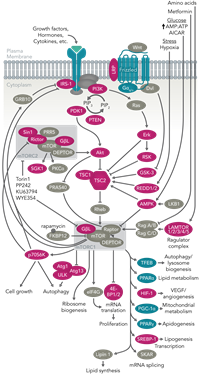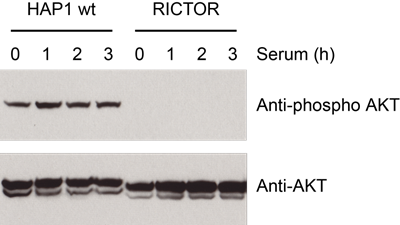
mTOR plays important roles in a variety of cellular processes including; cell growth, cell survival, motility, transcription and cell proliferation. It acts a central hub, integrating signals from a number of upstream pathways including Ras, PI3K and IRS-1 and therefore plays an important role in responding to signals from growth factors, amino acids and insulin. It also plays a role in cellular nutrient, oxygen and energy sensing.
mTOR related conditions and inhibitors
These broad activities mean that its dysregulation is implicated in a number of conditions including diabetes, obesity, cancer and Alzheimer’s disease.
It is also of great interest in the aging process and organ transplants, inhibitors such as rapamycin are used to prevent transplant rejection.
mTOR achieves its diverse roles through participating in two protein complexes referred to as mTOR complex 1 (mTORC1) and mTOR complex 2 (mTORC2) which differ in subcellular localization and binding partners.
While mTORC1 regulates translation through 4EBP1 and p70S6K, mTORC2 activates AKT through phosphorylation at Ser473.
Experimental validation

AKT phosphorylation is lost in RICTOR Knockout Cell Lines. Cells starved in 0.5% fetal calf serum over night and subsequently stimulated with 10% FCS for 0,1,2 or 3h (as indicated).
Cells were washed with PBS, lysed in Frackelton buffer (10 mM Tris/HCl pH 7.5, 50 mM NaCl, 30 mM sodium pyrophosphate, 1 % Triton X-100, 50 mM NaF and protease inhibitors) and analyzed by SDS-PAGE and Western blotting using anti-phospho AKT (Ser 473; #4058 from Cell Signaling) or anti-AKT (#4691 from Cell Signaling). HAP1 wild-type cells were compared to cells bearing a frameshift mutation in RICTOR.
Explore our popular knockout cell lines for mTOR Pathway
| AKT1 | GSK3B | PDPK1 | RPS6KA1 |
| AKT2 | HIF1A | PIK3C2B | TSC1 |
| AKT3 | IRS1 | PIK3CA | TSC2 |
| ATG13 | LAMTOR4 | PIK3CB | ULK1 |
| DDIT4 | LRP5 | PIK3CD | ULK4 |
| DDIT4L | LRP6 | PRKAB1 | |
| EIF4EBP1 | MLST8 | PTEN |
Order products
Human knockout HAP-1 cells
The single largest bank of isogenic cell lines with over 7,500 cell lines to choose from and trusted by academia, biotech, and pharma research labs.
Cancer-related cell lines
Choose from over 300 knock-in and knockout cell line models in many standard cancer cell lines such as DLD1, MCF10A, and HCT116.
Cas9 Stable Cell Lines
Simplify gene editing experiments with stably expressing Cas9 cell lines
CRISPRmod CRISPRa dCas9-VPR Stable Cell Lines
Streamline CRISPR activation experiments with stably expressing dCas9-VPR cell lines
